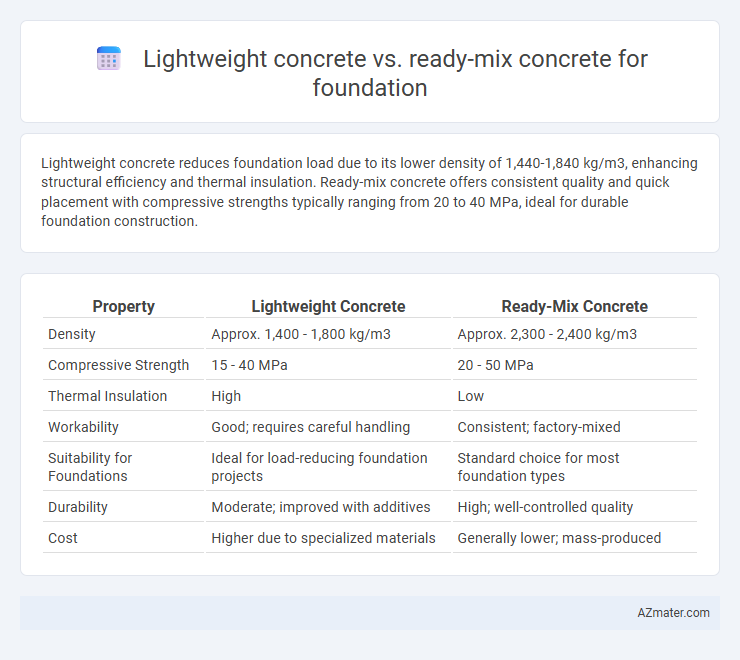Lightweight concrete reduces foundation load due to its lower density of 1,440-1,840 kg/m3, enhancing structural efficiency and thermal insulation. Ready-mix concrete offers consistent quality and quick placement with compressive strengths typically ranging from 20 to 40 MPa, ideal for durable foundation construction.
Table of Comparison
| Property | Lightweight Concrete | Ready-Mix Concrete |
|---|---|---|
| Density | Approx. 1,400 - 1,800 kg/m3 | Approx. 2,300 - 2,400 kg/m3 |
| Compressive Strength | 15 - 40 MPa | 20 - 50 MPa |
| Thermal Insulation | High | Low |
| Workability | Good; requires careful handling | Consistent; factory-mixed |
| Suitability for Foundations | Ideal for load-reducing foundation projects | Standard choice for most foundation types |
| Durability | Moderate; improved with additives | High; well-controlled quality |
| Cost | Higher due to specialized materials | Generally lower; mass-produced |
Key Differences Between Lightweight Concrete and Ready-Mix Concrete
Lightweight concrete contains expanded aggregates such as pumice or expanded clay, resulting in lower density and higher insulation properties compared to ready-mix concrete, which uses normal-weight aggregates for higher strength and durability. Ready-mix concrete is delivered in a fresh, standardized state from batching plants, allowing consistent quality control and faster application for foundations, whereas lightweight concrete offers improved thermal resistance and reduced structural load but may require specialized mix designs. The choice between the two depends on specific foundation requirements, balancing factors like structural load capacity, thermal insulation, and curing time.
Composition and Material Properties
Lightweight concrete for foundations primarily incorporates low-density aggregates such as expanded clay, shale, or pumice, resulting in reduced dead load and improved thermal insulation compared to ready-mix concrete, which uses conventional aggregates like crushed stone and gravel for higher compressive strength. The lower density of lightweight concrete typically ranges from 1440 to 1840 kg/m3, while ready-mix concrete density spans 2240 to 2400 kg/m3, affecting the structural weight and load-bearing capacity. Material properties such as thermal conductivity, shrinkage, and tensile strength differ significantly, with lightweight concrete offering improved fire resistance and energy efficiency but generally lower strength parameters than the more consistent, high-strength ready-mix concrete used in foundation applications.
Weight and Density Comparison
Lightweight concrete typically has a density ranging from 1,200 to 1,800 kg/m3, making it significantly lighter than ready-mix concrete, which generally ranges between 2,300 to 2,500 kg/m3. The reduced density of lightweight concrete results in lower structural load, improving foundation efficiency and reducing the need for extensive reinforcement. Ready-mix concrete, with its higher weight and density, offers greater strength but can increase foundation costs and require more robust support systems.
Structural Strength and Load-Bearing Capacity
Lightweight concrete offers reduced density, improving seismic performance while maintaining adequate structural strength for moderate load-bearing in foundations. Ready-mix concrete provides higher compressive strength and superior load-bearing capacity, making it ideal for heavy structural demands and large-scale foundation projects. Choice depends on project requirements, balancing weight considerations with maximum strength and durability.
Thermal and Acoustic Insulation Features
Lightweight concrete offers superior thermal insulation due to its lower density and air entrainment, which significantly reduces heat transfer in foundation applications. Its porous structure also enhances acoustic insulation by absorbing sound waves, making it ideal for noise-sensitive environments. In contrast, ready-mix concrete, while structurally strong and consistent, has higher thermal conductivity and less effective sound insulation properties compared to lightweight alternatives.
Durability and Longevity in Foundations
Lightweight concrete offers enhanced durability for foundations due to its low density and improved resistance to freeze-thaw cycles, reducing structural stress over time. Ready-mix concrete provides consistent quality and high compressive strength, ensuring long-lasting foundation performance under heavy loads. Both materials contribute to foundation longevity, but lightweight concrete excels in thermal insulation and minimizing cracking, while ready-mix concrete is preferred for robustness and uniformity.
Workability and Ease of Installation
Lightweight concrete offers superior workability due to its reduced density and enhanced flow characteristics, making it easier to handle and place in foundation applications compared to traditional materials. Ready-mix concrete provides consistent quality and optimized mix designs that simplify installation while maintaining structural integrity. The choice between lightweight and ready-mix concrete depends on project requirements, with lightweight concrete favored for reduced load-bearing needs and ready-mix concrete preferred for standard foundation strength and rapid placement.
Cost Considerations and Budget Impact
Lightweight concrete generally reduces overall foundation costs due to lower material density, resulting in less excavation and reduced structural support requirements. Ready-mix concrete typically involves higher initial expenses from transportation and batching but offers consistent quality and faster application, minimizing labor costs. Budget impact varies by project scale; lightweight concrete favors long-term savings in seismic areas or high-rise constructions, while ready-mix suits straightforward, time-sensitive foundations with established supply chains.
Environmental Impact and Sustainability
Lightweight concrete reduces the environmental impact by utilizing recycled materials such as fly ash and expanded shale, lowering the overall carbon footprint compared to traditional ready-mix concrete. Ready-mix concrete typically involves higher cement content, resulting in increased CO2 emissions during production, whereas lightweight variants improve thermal insulation and reduce energy demand in building operations. Selecting lightweight concrete for foundations supports sustainable construction through enhanced durability and resource efficiency, aligning with green building standards and reducing waste.
Best Application Scenarios for Each Concrete Type
Lightweight concrete is best suited for foundations requiring reduced structural load, such as high-rise buildings or areas with poor soil bearing capacity, due to its lower density and thermal insulation properties. Ready-mix concrete offers superior strength and uniformity, making it ideal for standard foundations in commercial and residential construction where high load-bearing capacity and durability are critical. Selecting the appropriate concrete type depends on project-specific factors like load requirements, environmental conditions, and construction speed.

Infographic: Lightweight concrete vs Ready-mix concrete for Foundation
 azmater.com
azmater.com